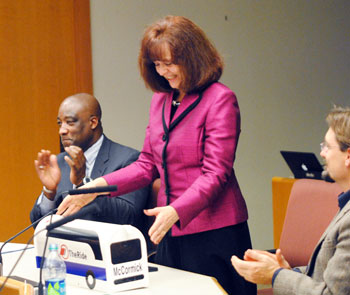AATA Preps Stage for Future Transit Choice
Ann Arbor Transportation Authority board meeting (Dec. 15, 2011): At its last meeting of the year, the AATA board bid farewell to boardmember Sue McCormick, voted to give its CEO Michael Ford a 3% raise, and paused a proposed $247,000 contract with a pair of consultants, who’ve been selected to conduct an internal organizational review of the AATA.

Outgoing AATA board member Sue McCormick receives the traditional token of appreciation from the AATA – a mailbox marked up to resemble an AATA bus. (Photos by the writer.)
Background for the meeting included a proposed four-party agreement between the AATA, Ann Arbor, Ypsilanti and Washtenaw County that would set a stage to allow voters countywide to transition AATA into a countywide-funded transit authority. On Dec. 7, 2011, Ford presented the four-party agreement to the Washtenaw County board of commissioners. The Ann Arbor city council also received a presentation on the proposed four-way agreement at a Dec. 12, 2011 working session.
The four-way agreement is in large part an if-then statement: If an adequate funding source can be identified for a countywide authority (likely through a voter-approved tax) then the assets of the AATA would be transfered to the new authority, along with the existing transit tax the cities of Ann Arbor and Ypsilanti currently levy. The county would file the articles of incorporation, but would not incur any liability.
Also in December, a subcommittee of the advisory group that is reviewing financial aspects of the countywide transit master plan (TMP) met to continue its work analyzing the proposed elements of expanded service. The intended early January finish date for the group’s white paper to be delivered to the AATA has slipped somewhat, because of legislation that may start moving through Michigan’s House of Representatives in January 2012.
Current AATA initiatives mentioned at the Dec. 15 board meeting include ongoing contract negotiations with Michigan Flyer to provide public transit service from Ann Arbor to Detroit Metro airport, the reconstruction of the downtown Ann Arbor Blake Transit Center, and the development of a new website.
Other highlights from the board’s meeting included a discussion of the two-grocery-bag limit for AATA’s para-transit service, and public commentary on a pending lawsuit against the AATA over its decision to reject an advertisement for the sides of its buses that calls for a boycott of Israel. [Full Story]




